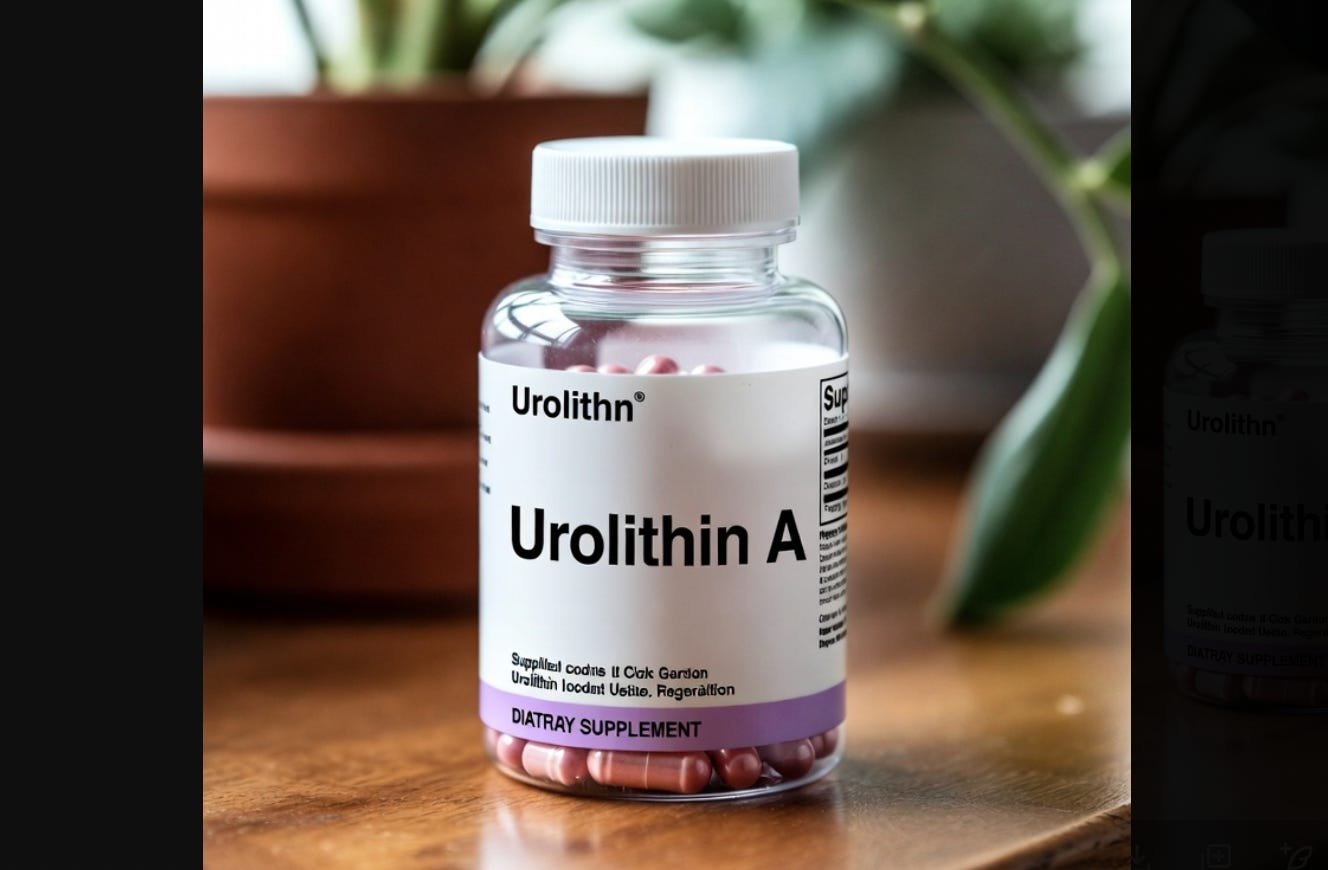Well Being: Biohacking with Urolithin A
A great anti-aging supplement: expensive but worth it
I recently stumbled across a supplement for which clinical data were released on October 31, 2025. The data shook my biohacking worldview regarding anti-aging.
The article in Nature Aging, titled “Effect of the mitophagy inducer urolithin A on age-related immune decline: a randomized, placebo-controlled trial,” reveals that taking Urolithin A daily for a month can have exciting effects on middle-aged healthy adults. It helps shift the immune system to a more youthful state, with more naive CD8+ T cells (Helper T), a less exhausted phenotype, better metabolic flexibility, stronger activation responses, and improved phagocytosis. You are probably unaware of the problem of “immunosenescence,” but aging of the immune system (particularly cellular immune responses) is a major contributor to morbidity and mortality in the elderly. These positive changes associated with Urolithin A suggest that supporting mitochondrial health, by encouraging mitophagy and mitochondrial renewal, might be a helpful way to combat some aspects of immune aging.
Furthermore, other clinical trials have documented that this supplement improves muscle strength and endurance, particularly in older adults.
What is Urolithin A and Dosing:
What It Is
Urolithin A is not found directly in food. Instead, it is a compound produced in the gut when specific gut bacteria break down certain plant nutrients.
Where It Comes From
Urolithin A is derived from ellagitannins and ellagic acid, which are found in:
Pomegranates
Walnuts
Raspberries
Strawberries
Blackberries
Pecans
Only about 40% of people have the correct gut microbes to make Urolithin A naturally, as not everyone has the same gut biome.
How It Works
You eat foods rich in ellagitannins.
Gut bacteria convert these to ellagic acid.
Other gut microbes transform ellagic acid into Urolithin A.
Urolithin A is absorbed into the bloodstream and benefits cells.
Key Benefits
Urolithin A improves aspects of immune aging in humans
Promotes mitophagy (cleans out damaged mitochondria)
Supports muscle strength and endurance, especially in aging
Has anti-inflammatory and antioxidant effects
May promote healthy aging and longevity
Because of these benefits, Urolithin A is being manufactured and distributed as an over-the-counter nutritional supplement, often produced synthetically or through fermentation using specific bacterial strains that can mimic the gut conversion process.
One commercial form is Mitopure®, developed by the company Amazentis, which has been clinically tested for muscle and mitochondrial health. This brand is also made in the USA, third-party tested and certified, and backed by major investors (including Nestle—for better or worse). That said, this brand is expensive, and this is not a cheap supplement. The dosing being sold by this company is 500 mg/day - so there is definitely less of the supplement per dose - but they have been pioneers in this field and so deserve some respect.
Amazon sells several brands also, that are third-party tested, made in the USA in a GMP-certified lab. This is a link to the one I went with, and some of the brands listed on Amazon are much, much less expensive - just be careful to buy GMP- third party tested product. So other companies are selling high-quality Urolithin A, and I am not an affiliate of any of them, so this is not a sales pitch.
This supplement is exciting because it supports the idea that mitochondrial quality (not just mass) matters for immune aging, and that a safe oral compound might help modulate it.
Dosing
In a clinical trial performed to investigate increased muscle strength and endurance, as well as the clinical trial that showed benefit for improving aspects of immune aging in humans, the dosing was 1,000 mg/day. Some brands recommend 500 mg/day, others suggest a 1000 mg/day dose.
In both of the gold-standard, RCTs (clinical trials), the 1000 mg per day dosing regimen was used and was well tolerated by the participants, which is why I personally went with that.
More details on the studies supporting the use of this supplement (for the science nerds)
Clinical trial #1
As we age, our immune system tends to slow down: with fewer fresh (“naïve”) T-cells, more exhausted immune cells, and higher chronic inflammation (sometimes called inflammaging) being the result.
The Nature study proposed that the root of this issue is mitochondrial dysfunction (damaged mitochondria, less efficient energy/clearance) and weaker mitophagy (the process by which cells recycle damaged mitochondria).
The authors asked a simple question: can a compound that induces mitophagy — namely Urolithin A, improve aspects of immune aging in humans?
What did the study do?
They ran a randomized, double-blind, placebo-controlled trial: 50 healthy middle-aged adults (ages 45-70) were assigned to take either 1,000 mg/day Urolithin A or placebo for 4 weeks.
Primary outcomes: changes in circulating T-cell subsets (particularly CD8+ T cells) and metabolic/mitochondrial activity in T cells.
Secondary/exploratory outcomes: cytokine levels in plasma, other immune-cell populations (NK cells, monocytes), immune‐cell functional assays, and single-cell RNA-seq to look at gene‐expression changes.
What did it find?
Safety / tolerability: Urolithin A was well tolerated over the 28 days—adverse events were similar between Urolithin A and placebo groups, and no significant changes in liver/kidney labs.
Immune cell‐population changes:
Compared with placebo, the Urolithin A group showed a statistically significant increase in the percentage of circulating naive CD8+ T cells (“Tₙ”) after 28 days.
Also in CD8+ cells: more cells expressing Ki-67 (a proliferation marker), and reduced expression of TOX (a regulator linked to T cell exhaustion).
No significant changes in CD4+ T cell subsets were observed.
Other immune populations: Urolithin A increased frequencies of CD56dim CD16bright NK cells and non-classical monocytes (CD14lo CD16hi). Also, classical monocytes exhibited a less inflammatory phenotype (lower HLA-DR) after Urolithin A.
Metabolic / mitochondrial changes:
Using a flow-cytometry based assay (SCENITH) to profile metabolic dependencies: After Urolithin A, CD8+ T cells exhibited reduced glucose dependence and increased fatty-acid oxidation (FAO) and amino-acid oxidation (AAO) capacity.
In CD8+ cells, expression of PGC-1α (a master regulator of mitochondrial biogenesis) was increased in Urolithin A group, suggesting enhanced mitochondrial “renewal.”
Although mitochondrial mass did not change (as measured by dye), the functional/biochemical profile suggests improved mitochondrial quality/control rather than just more mitochondria.
Functional readouts & gene-expression:
In stimulated CD8+ T cells from Urolithin A‐treated participants, there was improved TNF secretion (i.e., better activation response), without a pathological increase in IL-4 (which might indicate unwanted type2 skewing).
Monocytes from Urolithin A group showed improved uptake of E. coli particles (better phagocytosis).
Single‐cell RNA-seq (exploratory) found that in CD8+ T cells of Urolithin A‐treated folks: up-regulation of “stemness”/naive‐T cell genes (e.g., TCF7/LEF1) and down-regulation of exhaustion/inhibitory genes (e.g., NR4A2, CREM).
What does it mean?
Taking Urolithin A daily for a month in middle-aged healthy adults induced a shift in the immune system toward a “younger” profile: more naive CD8+ T cells, less exhausted phenotype, enhanced metabolic flexibility, better activation responses, improved phagocytosis. These changes suggest that improving mitochondrial health (via inducing mitophagy & mitochondrial renewal) can help counter some aspects of immune aging.
The authors note that Urolithin A could, in the future, help bolster vaccine responses, reduce infection risk in older adults, or enhance immunotherapy responses in cancer, but those are very speculative at this stage.
Caveats and next-steps
This was a short-duration (4 weeks) trial in healthy middle-aged adults (45-70). We don’t yet know if the effects persist long-term, or if they translate into real-world outcomes (fewer infections, better vaccine responses, delayed onset of disease).
Sample sizes for certain secondary/exploratory endpoints (e.g., cytokines, scRNA-seq) were modest, so results are promising but need replication.
The mechanism (mitophagy induction → mitochondrial renewal → immune remodeling) is plausible and supported, but in humans still somewhat indirect. The authors admit they didn’t formally measure mitophagy markers in vivo in this trial.
Only CD8+ T cells showed strong effects; CD4+ T cells less so in this trial. So the effect may be subset‐specific.
Since the participants were healthy and middle-aged, it’s unclear whether older folks (e.g., > 80) or people with chronic disease would respond similarly.
In layman’s terms:
If you imagine the immune system as a car: as we age the engine runs less smoothly, fuel economy drops, and the “maintenance schedule” gets lax (damaged mitochondria accumulate).
What this study suggests is that giving the engine a “clean-up and tune-up” may help restore smoother operation: the T Helper cells are more like “fresh drivers” (naive), less like “burnt-out commuters” (exhausted), and they have better metabolic flexibility (can burn fats/amino acids rather than be stuck on pure glucose).
While this won’t immediately translate to crossing the finish line of “no more age-related immune decline,” it’s a very promising pit stop in the right direction.
Clinical trial #2
Design: Randomized, placebo-controlled trial in untrained, overweight, middle-aged adults (40-64 yrs) for 4 months of Urolithin A supplementation (500 mg or 1,000 mg) vs placebo.
Key findings:
Urolithin A supplementation significantly improved leg-muscle strength (hamstring isokinetic peak torque) at both doses compared with placebo.
Urolithin A 1,000 mg group showed a within-group increase in aerobic endurance (peak VO₂) and better performance on the 6-minute walk test (6MWT).
Biomarkers associated with mitochondrial function and inflammation improved: plasma acylcarnitines decreased, C-reactive protein (CRP) decreased—these indicate improved mitochondrial efficiency & lower systemic inflammation.
In skeletal muscle tissue analyses (vastus lateralis), Urolithin A increased the expression of proteins linked to mitophagy and mitochondrial metabolism.
Urolithin A was well tolerated.
Interpretation: The authors conclude that Urolithin A is a promising nutritional intervention for improving muscle strength and mitochondrial health in middle-aged adults, particularly in the context of age-related declines in muscle/mitochondrial function.
Benefits reported (summarized)
Here are the key beneficial effects observed (or suggested) in human trials and reviews:
Improved muscle strength: Urolithin A supplementation led to measurable gains in strength (≈10-12 %) in leg muscles in the 4-month trial.
Increased endurance/physical performance: There were improvements in aerobic fitness (peak VO₂) and walking‐test performance for Urolithin A vs baseline.
Improved mitochondrial biomarkers: Less accumulation of acylcarnitines (which reflect mitochondrial inefficiency), decreased inflammation marker CRP, increased mitophagy/mitochondrial metabolism proteins in muscle.
Potential anti-inflammatory effect: Lowering CRP and other metabolic/inflammatory biomarkers indicates Urolithin A may reduce low-grade chronic inflammation (often seen with aging).
In the trials so far, Urolithin A has been well tolerated in middle-aged to older adults.
Summary:
The data suggest that taking Urolithin A daily shifts the immune system toward a “younger” profile. These changes suggest that improving mitochondrial health (via inducing mitophagy & mitochondrial renewal) can help counter some aspects of immune aging. Furthermore, this supplement enhances muscle strength and performance.
The downside of this supplement is that it can be expensive. But otherwise, this one has been added to my list of “must-haves.”

